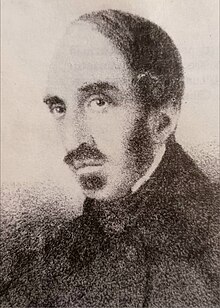Dimitrie Ralet | |
|---|---|
 Ralet in D. I. Cerbureanu's 1856 print | |
| Born | c. 1816 Bukovina District, Austrian Empire, or Istanbul, Ottoman Empire |
| Died | 25 October 1858 (aged 40–43) Botoșani or Bucecea, Moldavia |
| Occupation |
|
| Period | 1837–1859 |
| Genre | |
| Literary movement | Romanticism |
Dimitrie Ralet (also rendered as Rallet, Ralett, Ralleti or Raletu; Cyrillic: Дімітріє Ралєт,[1] Раллєтȣ, or Раллєтi;[2] c. 1816 – 25 October 1858) was a Moldavian political figure and celebrated contributor to Romanian literature. Belonging to the upper strata of boyardom, he was of Phanariote and Aromanian descent, and may not have been born in Moldavia; his family history, as well as the circumstances of his birth and early life, remain mysterious and controversial. His father, the Spatharios Alexandru Ralet, was a judge in the northern Moldavian city of Botoșani, and the owner of Bucecea town. Possibly educated abroad, and already a polyglot in his twenties, Dimitrie took over his father's job at the tribunal in 1841—but only served briefly, and with interruptions. He first published as a translator in 1837, before making his actual debut in 1840, with short essays in social satire that evidenced a deep familiarity with 18th-century French literature. Ralet was an introspective and self-deprecating adherent of Romanticism, whose youthful contributions helped establish a deadpan register in modern Romanian humor.
Though created an Aga by the conservative Prince Mihail Sturdza, Ralet embraced rebellious liberalism, endeavoring to outlaw slavery, and exposing Sturdza as the ringleader of a corrupt boyar clique. He arrived at espousing Romanian nationalism, whose immediate agenda was the political unification of Moldavia and Wallachia. Rallying with the National Party in the failed uprising of 1848, he apparently escaped punishment, and networked with the other anti-Sturdzaists from his home in Botoșani. Ralet joined a National-Party cabinet formed by Prince Grigore Alexandru Ghica in 1849, when he contributed to the abolition of slavery, the introduction of educational reforms, and the first steps toward the confiscation of monastery estates. During the Crimean War, as Ghica's diplomat, he advanced points of policy which moved Moldavia closer to the Western powers, and away from her status as a tributary state of the Ottoman Empire. His and Costache Negri's attempt to litigate on the monasteries issue took them on an extended trip to Istanbul.
Ralet was a propagandist for the unionist platform ahead of legislative election in July 1857, opposing the conservative-separatist caucus formed around Caimacami Teodor Balș and Nicolae Vogoride. He exposed Vogoride's discrimination and electoral fraud to international attention, being largely responsible for repeat elections in September. He was subsequently a distinguished figure in the Ad-hoc Divan of Iași, where, as a moderate, he helped recruit conservatives for the unionist cause. His final literary works include comedic plays which were widely acclaimed, including by modern critics, his own version of Hora Unirii, as well as a travelogue of his oriental journey—one of the first such texts by a Moldavian, and among the masterpieces of the genre in its Romanian context. Ralet spent some of his final months in French Empire, trying to obtain support for the union, and also looking after his aggravated tuberculosis. He died upon his return, without managing to see the establishment the United Principalities, occurring just months later.
© MMXXIII Rich X Search. We shall prevail. All rights reserved. Rich X Search
